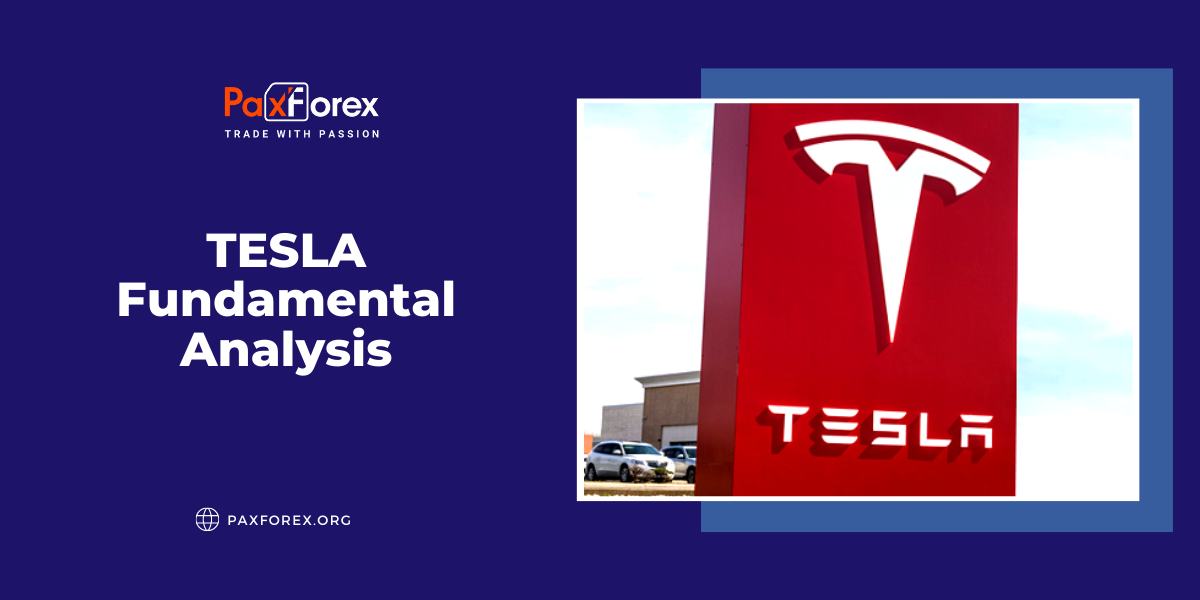
Source: PaxForex Premium Analytics Portal, Fundamental Insight
Volatility is an inherent characteristic of the stock market, akin to the inseparable combination of peanut butter and jelly. Even the market's most successful players, such as electric vehicle (EV) and technology giant Tesla, are not immune to its effects.
Over the past three years alone, Tesla has experienced significant highs followed by declines of at least 25%, including a staggering 75% drop that it is still recovering from. Charlie Munger, Warren Buffett's esteemed associate, once remarked that investors should be prepared for mediocre results if they cannot endure the occasional 50% decline.
While Tesla shares currently stand 36% below their previous peak, they have rallied an impressive 112% this year. The question arises: Is the stock poised to reach new heights, or should investors exercise caution after witnessing a rapid doubling of the share price in just a few months?
When assessing Tesla, it is common for investors to draw comparisons with traditional automotive companies like Ford or General Motors. However, this approach may be flawed as Tesla's unique positioning sets it apart. While all these companies are involved in vehicle manufacturing, a capital-intensive and competitive industry, a closer look at the numbers reveals Tesla's notable strengths. Despite generating only half the revenue of legacy brands, Tesla outperforms them in terms of free cash flow and exhibits faster revenue growth.
What truly sets Tesla apart is its strategic position within numerous potential growth markets. Electric vehicles (EVs) are increasingly poised to dominate the industry's future, and Tesla has played a significant role in mainstreaming them in the United States. As the clear leader in battery-electric vehicles (BEVs) worldwide, Tesla has a substantial advantage. Moreover, the upcoming release of innovative models like the Cybertruck and Tesla Semi further strengthens its position. Notably, Ford and General Motors are even willing to pay Tesla for access to its charging network, which presents an additional revenue stream.
In addition to its EV success, Tesla has successfully established a presence in other promising markets that will shape the next decade. These include autonomous driving, green energy and storage, artificial intelligence, and robotics. Few companies have such diverse ventures underway. While not all endeavors may succeed, Tesla's multiple initiatives increase the likelihood of hitting a home run.
Overall, when evaluating Tesla, it is crucial to consider its unique strengths, market leadership in key areas, and the multitude of potential growth opportunities it has ventured into.
Maintaining a balanced perspective is crucial, combining both optimism and skepticism when evaluating Tesla's future prospects. While the company undoubtedly possesses significant long-term growth potential, it is important to acknowledge the challenges inherent in its core business of selling expensive, high-value items to consumers. Consumer spending habits directly impact Tesla's business, and there are indications that the company could encounter difficulties in the short term.
To begin with, Tesla has implemented several price cuts in recent months, which have already begun to impact its operating margin. Furthermore, inventory levels have steadily increased, surging to $14.3 billion over the past two years. This trend raises concerns about the company's ability to move vehicles efficiently in the near future.
One could argue that these issues are temporary and that as the economy rebounds, consumers will once again show a willingness to invest in new vehicles. However, it is important for investors to consider this potential weakness, especially in light of the stock's strong rally. Careful consideration should be given before placing a buy order for Tesla shares, taking into account these factors and their potential implications on the company's performance.
Considering the available information, investors can assess the current value proposition of Tesla's stock. Analysts' projections suggest that Tesla's earnings per share for the full year of 2023 will be approximately $3.50. This translates to a price-to-earnings ratio (P/E) of 75, indicating a relatively high valuation. Moreover, consensus estimates anticipate an average annual earnings growth rate of 25% for Tesla, resulting in a price/earnings-to-growth (PEG) ratio of 3.
Typically, a PEG ratio above 1.5 is considered on the expensive side, suggesting that Tesla's stock is trading at a high price relative to its growth prospects. Additionally, factors such as uncertainty surrounding profit margins, ongoing price cuts, and increasing inventory levels raise concerns about potential impacts on earnings growth. These uncertainties may exert downward pressure on the stock, leaving little margin of safety at such a steep valuation.
While Tesla's long-term future appears promising and the stock may potentially experience significant growth over the next five or 10 years, the current valuation does not appear to offer sufficient value for investors seeking to buy shares.
As long as the price is above 240.00, follow the recommendations below:
- Time frame: D1
- Recommendation: long position
- Entry point: 277.31
- Take Profit 1: 285.00
- Take Profit 2: 300.00
Alternative scenario:
If the 240.00 level is broken-down, follow the recommendations below:
- Time frame: D1
- Recommendation: short position
- Entry point: 240.00
- Take Profit 1: 223.00
- Take Profit 2: 210.00













